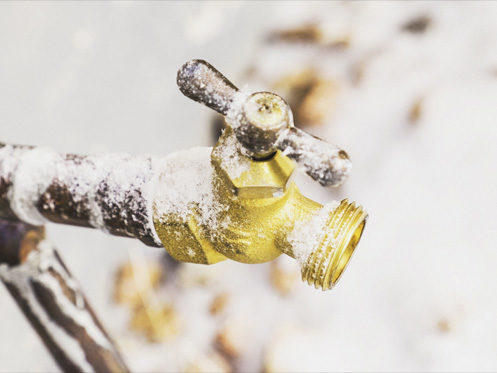It’s an uneasy feeling when you turn on a faucet during a cold winter, and nothing comes out. You know the water bill was paid, and the kitchen faucet worked a few minutes ago. But the bathroom faucet is not working…hmmm. Then reality hits…the pipes may be frozen. The “Cold, Hard Facts” are ice is blocking your water supply pipes, and water will not pass through.
When you experience frozen pipes, there are some basic steps to take. If you see splits in the pipe, turn off the water supply and call your plumber. Most plumbers have special thawing equipment and can make the repairs right away.
If there are no visible splits in the pipes, turn on any faucets that have water flow. Even a few drops of water flow will help thaw frozen pipes. Turn the heat up and carefully put space heaters near the problem area. If they are electric space heaters, make sure not to mix electricity and water. If you have fossil fuel space heaters, provide adequate ventilation to prevent carbon monoxide poisoning. Keep all heaters at a safe distance from combustibles. Be ready to shut off the water because when the pipes thaw out they sometimes blow apart and the floods begin!
If you have to leave your home and the pipes are still frozen, shut off the main water supply.
Sometimes it’s the unknown frozen pipe damage that causes problems. An example is when frostproof hose bibs are turned on for the first time after freezing that flood homes. Frostproof hose bibs have a pipe that extends into the home and by design water is supposed to drain out when the hose bib is shut off. Leaving the water hose connected will trap the water, which allows this short piece of pipe to split when it freezes.
The vast majority of frozen pipes are the result of improper installation. There are some basic rules of thumb when installing plumbing:
1. Cold drafts are responsible for the majority of freeze-ups. Seal cracks to prevent cold air from reaching pipes. Always keep thermostats at 55 degrees or above.
2. Do not install plumbing in an “outside wall” or areas near cold temperatures. This includes sewer pipes as well as water supply pipes.
3. Insulation may help keep cold off of pipes, but it does not add heat to the pipe. Improperly installed insulation can cause problems. Insulation should be installed between the cold areas and the pipe while allowing heat transfer from warmer areas.
4. Heat tapes are occasionally used to keep pipes from freezing. Heat tapes can be dangerous, and when they fail there may be sparks. Heat tapes can trip electrical circuit breakers, or maybe unplugged accidentally. This often happens at a time when you need them the most. Heat tapes can cause serious problems and should only be used with caution.
5. Ask a reputable plumber for advice if you have concerns about frozen pipes. There are often simple solutions. Avoid handymen that lack experience and insurance. A licensed plumber is required to take out plumbing permits for all installations. The City of Lincoln Plumbing Codes requires various forms of freeze protection for all plumbing, including depth minimums for buried pipes. If the required permits were taken out, the inspection process will normally address problem areas that do not meet the code. Installing plumbing legally with the proper plumbing permits will reduce damage risks and could be helpful to settle insurance claims if there are damages from frozen pipes.
Do you have a plumber that answers the phone 24 hours a day and is staffed 7 days a week? The reality is approximately 90% of the plumbing companies do not answer their phones after hours or provide service. Most have answering machines and can work you into their schedules eventually.
It’s important to have a plumbing company that provides emergency service because odds are better plumbing emergencies will occur after normal working hours. A full-service plumbing company can even help remove the water and recommend restoration companies if needed.
Mild winters tend to give us a false sense of security. This has not been a mild winter so far and it’s not over. There have been a lot of frozen pipes. The frost is going deeper into the ground, which probably will cause more water main problems and breaks this spring. That’s the “Cold Hard Facts”. Hopefully, everyone will be ready.

